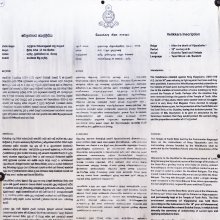Anartha: 20 definitions
Introduction:
Anartha means something in Hinduism, Sanskrit, Jainism, Prakrit, Marathi, Hindi. If you want to know the exact meaning, history, etymology or English translation of this term then check out the descriptions on this page. Add your comment or reference to a book if you want to contribute to this summary article.
Anartha has 19 English definitions available.
Alternative spellings of this word include Anarth.
Images (photo gallery)
Languages of India and abroad
Sanskrit dictionary
[Deutsch Wörterbuch]
Source: Cologne Digital Sanskrit Dictionaries: Böhtlingk and Roth Grosses Petersburger WörterbuchAnartha (अनर्थ):—1. (3. a + artha) m.
1) Ungehöriges, Unnützes [Yāska’s Nirukta 9, 4. 10, 34.] —
2) Nachtheil, Schaden, Unheil: arthānarthāvubhau buddhvā [Manu’s Gesetzbuch 8, 24.] evaṃ niṣphalamārabdhaṃ kevalānarthasaṃhitam [Daśaratha’s Tod 1, 28.] [Rāmāyaṇa 2, 9, 29. 12, 52. 97.] mahāntamanarthaṃ prāpsyasi [Pañcatantra 162, 8.] tanme mahānanarthaḥ syāt [226, 12.] anarthārthamāgatām zum Unheil gekommen [Rāmāyaṇa 3, 27, 1.] arnathubaddhi adj. [1, 2, 32.] anarthabuddhitva (Gegens. guṇasaṃskāra) [5, 85, 5.] ekaikamapyanarthāya kimu yatra catuṣṭayam [Prooemium im Hitopadeśa 10.] dāturbhavatyanarthāya [Manu’s Gesetzbuch 4, 193.] [Rāmāyaṇa 2, 12, 8.] rāvaṇānarthamicchataḥ [5, 9, 40.] dvāvanarthau niṣevate [Pañcatantra I, 379.] mamānarthadvayametatsaṃjātam [225, 16.] yojayeyamanarthaiśca [Rāmāyaṇa 6, 98, 26.] Das Sprichwort randhropanipātino narthāḥ ( [Śākuntala 81, 8.]) oder chidreṣvanarthā bahulībhavanti ( [Pañcatantra II, 187. 246, 1.] [Hitopadeśa I, 198.]) ententspricht dem deutschen ein Unglück kommt nie allein.
--- OR ---
Anartha (अनर्थ):—2. (wie eben) adj.
1) unnütz [Pañcatantra 248, 6.] —
2) unglücklich: śokārttānāmanarthānāmevaṃ naḥ paridhāvatām [Rāmāyaṇa 3, 75, 40.] —
3) Unheil bringend: so yaṃ mūlaharo narthaḥ sarveṣām [Rāmāyaṇa 6, 21, 15.]
--- OR ---
Anartha (अनर्थ):—1.
2) [Spr. 3454. fg.] arthadairanarthapratighātibhiḥ [Daśakumāracarita] in [Benfey’ Chrestomathie aus Sanskritwerken 181, 1.] anubaddhārthānarthasaṃśayān 2. pañjara [Spr. 1446] (Conj.). paṇḍita sich auf Unheii verstehend d. i. Unheil zu stiften verstehend (oder zu 2. anartha [3.) 2352.]
--- OR ---
Anartha (अनर्थ):—2.
4) bedeutungslos [Prātiśākha zum Atharvaveda 4. 3.]
Source: Cologne Digital Sanskrit Dictionaries: Sanskrit-Wörterbuch in kürzerer FassungAnartha (अनर्थ):—1. m. —
1) Unnützes , Ungehöriges , Unsinn. —
2) Nachtheil , Schaden , Uebel [94,3.163,19.164,26.]
--- OR ---
Anartha (अनर्थ):—2. Adj. —
1) unnütz. —
2) unglücklich. —
3) Unheil bringend. —
4) bedeutungslos.
Sanskrit, also spelled संस्कृतम् (saṃskṛtam), is an ancient language of India commonly seen as the grandmother of the Indo-European language family (even English!). Closely allied with Prakrit and Pali, Sanskrit is more exhaustive in both grammar and terms and has the most extensive collection of literature in the world, greatly surpassing its sister-languages Greek and Latin.
See also (Relevant definitions)
Starts with (+19): Anarthabhava, Anarthabhiru, Anarthabuddhi, Anarthadanda, Anarthadandavirati, Anarthadarshi, Anarthadarshin, Anarthagriha, Anarthajna, Anarthaka, Anarthakama, Anarthakapada, Anarthakara, Anarthakari, Anarthakarin, Anarthakramti, Anarthakya, Anarthalupta, Anarthamana, Anarthamandira.
Ends with (+24): Ajivanartha, Ajnanartha, Ananartha, Arthanartha, Avalokanartha, Bahvanartha, Bahyanartha, Bhojanartha, Brahmanartha, Damanartha, Darshanartha, Ekanartha, Jivanartha, Kalyanartha, Kamanartha, Karanartha, Kridanartha, Mahanartha, Majjanartha, Manartha.
Full-text (+30): Anarthabhava, Anarthanashin, Anarthatva, Anarthalupta, Anarthakara, Anarthaka, Anarthabuddhi, Bahvanartha, Anarthasamshaya, Anarthabhiru, Anarthadarshin, Anarthakama, Anarthanivritti, Anarthakya, Anarthya, Anarthapata, Anarthaveksha, Bahyanartha, Mamakaram, Ruci.
Relevant text
Search found 29 books and stories containing Anartha, Anārtha, An-artha; (plurals include: Anarthas, Anārthas, arthas). You can also click to the full overview containing English textual excerpts. Below are direct links for the most relevant articles:
Bhajana-Rahasya (by Srila Bhaktivinoda Thakura Mahasaya)
Text 7 < [Chapter 2 - Dvitīya-yāma-sādhana (Prātaḥ-kālīya-bhajana)]
Text 42 < [Chapter 2 - Dvitīya-yāma-sādhana (Prātaḥ-kālīya-bhajana)]
Text 6 < [Chapter 4 - Caturtha-yāma-sādhana (Madhyāhna-kālīya-bhajana–ruci-bhajana)]
Shrimad Bhagavad-gita (by Narayana Gosvami)
Verse 8.28 < [Chapter 8 - Tāraka-brahma-yoga (the Yoga of Absolute Deliverance)]
Verse 15.20 < [Chapter 15 - Puruṣottama-toga (Yoga through understanding the Supreme Person)]
Verse 16.23 < [Chapter 16 - Daivāsura-sampada-yoga]
Sahitya-kaumudi by Baladeva Vidyabhushana (by Gaurapada Dāsa)
Text 10.203 [Viṣama] < [Chapter 10 - Ornaments of Meaning]
Text 4.45 < [Chapter 4 - First-rate Poetry]
Text 10.197 < [Chapter 10 - Ornaments of Meaning]
Bhakti-rasamrta-sindhu (by Śrīla Rūpa Gosvāmī)
Chaitanya Bhagavata (by Bhumipati Dāsa)
Verse 1.14.133 < [Chapter 14 - The Lord’s Travel to East Bengal and the Disappearance of Lakṣmīpriyā]
Verse 2.10.137 < [Chapter 10 - Conclusion of the Lord’s Mahā-prakāśa Pastimes]
Verse 3.4.386 < [Chapter 4 - Descriptions of Śrī Acyutānanda’s Pastimes and the Worship of Śrī Mādhavendra]
Brihad Bhagavatamrita (commentary) (by Śrī Śrīmad Bhaktivedānta Nārāyana Gosvāmī Mahārāja)
Verse 1.4.19 < [Chapter 4 - Bhakta (the devotee)]
Verse 2.1.191 < [Chapter 1 - Vairāgya (renunciation)]
Verse 2.3.147 < [Chapter 3 - Bhajana (loving service)]
